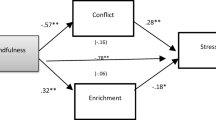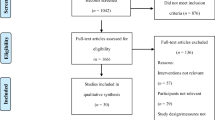Abstract
There is a well-documented evidence base for the beneficial effects of mindfulness-based interventions for various health issues, and research has increasingly explored the role of mindfulness in nonclinical contexts. While the Five Facet Mindfulness Questionnaire (FMMQ) was widely used to study dispositional mindfulness, no work has investigated the unique contributions of each mindfulness facet to depression, anxiety, and stress in a general population. The present study used psychometrically refined FFMQ and Depression, Anxiety and Stress Scale (DASS) scores obtained from a sample (n = 400) of equal number of students and general population. Multiple linear regression analysis was conducted to investigate predictive values of mindfulness facets to psychological distress variables. Nonjudgmental attitude was the strongest predictor of lower levels of depression, anxiety, and stress across both students and general population with standardized β ranging from − .32 to − .46. Nonreactivity was the second strongest predictor for stress and depression, but Acting with Awareness was a significant predictor for anxiety and stress in students only. Overall, mindfulness facets were stronger predictors of lower DASS scores in students compared to general population. Relationships between some mindfulness facets and distress variables differ between students and general population and therefore may not be generalizable across these populations.
Similar content being viewed by others
References
Allen, M. J., & Yen, W. M. (1979). Introduction to measurement theory. Monterey: Brooks/Cole.
Baer, R. A. (2003). Mindfulness training as a clinical intervention: a conceptual and empirical review. Clinical Psychology: Science and Practice, 10(2), 125–142.
Baer, R. A., Smith, G. T., Hopkins, J., Krietemeyer, J., & Toney, L. (2006). Using self-report assessment methods to explore facets of mindfulness. Assessment, 13(1), 27–45.
Baer, R. A., Smith, G. T., & Allen, K. B. (2004). Assessment of mindfulness by self-report: the Kentucky Inventory of Mindfulness Skills. Assessment, 11(3), 191–206.
Baer, R. A., Smith, G. T., Lykins, E., Button, D., Krietemeyer, J., Sauer, S., & Walsh, E. (2008). Construct validity of the Five Facet Mindfulness Questionnaire in meditating and nonmeditating samples. Assessment, 15(3), 329–342.
Baer, R. A. (2011). Measuring mindfulness. Contemporary Buddhism, 12(1), 241–261.
Bayram, N., & Bilgel, N. (2008). The prevalence and socio-demographic correlations of depression, anxiety and stress among a group of university students. Social Psychiatry & Psychiatric Epidemiology, 43, 667–672.
Bennett, K., & Dorjee, D. (2016). The impact of a mindfulness-based stress reduction course (MBSR) on well-being and academic attainment of sixth-form students. Mindfulness, 7(1), 105–114.
Bergin, A. J., & Pakenham, K. I. (2016). The stress-buffering role of mindfulness in the relationship between perceived stress and psychological adjustment. Mindfulness, 7(4), 1–12. https://doi.org/10.1007/s12671-016-0532-x.
Bergomi, C., Tschacher, W., & Kupper, Z. (2013). The assessment of mindfulness with self-report measures: existing scales and open issues. Mindfulness, 4(3), 191–202.
Bond, T. G., & Fox, C. M. (2007). Applying the Rasch Model: Fundamental measurement in the human sciences (2nd ed.). New York, NY: Routledge.
Bowlin, S. L., & Baer, R. A. (2012). Relationships between mindfulness, self-control, and psychological functioning. Personality and Individual Differences, 52(3), 411–415. https://doi.org/10.1016/j.paid.2011.10.050.
Bränström, R., Duncan, L. G., & Moskowitz, J. T. (2011). The association between dispositional mindfulness, psychological well-being, and perceived health in a Swedish population-based sample. British Journal of Health Psychology, 16(2), 300–316.
Brown, K. W., & Kasser, T. (2005). Are psychological and ecological well-being compatible? The role of values, mindfulness, and lifestyle. Social Indicators Research, 74(2), 349–368.
Brown, K. W., & Ryan, R. M. (2003). The benefits of being present: mindfulness and its role in psychological well-being. Journal of Personality and Social Psychology, 84(4), 822–848.
Brown, K. W., Ryan, R. M., & Creswell, J. D. (2007). Mindfulness: theoretical foundations and evidence for its salutary effects. Psychological Inquiry, 18(4), 211–237.
Buchheld, N., Grossman, P., & Walach, H. (2001). Measuring mindfulness in insight meditation (vipassana) and meditation-based psychotherapy: the development of the Freiburg Mindfulness Inventory (FMI). Journal for Meditation and Meditation Research, 1, 11–34.
Chadwick, P., Hember, M., Symes, J., Peters, E., Kuipers, E., & Dagnan, D. (2008). Responding mindfully to unpleasant thoughts and images: reliability and validity of the Southampton Mindfulness Questionnaire (SMQ). The British Journal of Clinical Psychology, 47(4), 451–455.
Chambers, R., Gullone, E., & Allen, N. B. (2009). Mindfulness emotion regulation: an integrative review. Clinical Psychology Review, 29(6), 560–572.
Chiesa, A., & Serretti, A. (2010). A systematic review of neurobiological and clinical features of mindfulness meditations. Psychological Medicine, 40(8), 1239–1252.
Clark, D. A., & Beck, A. T. (2010). Cognitive theory and therapy of anxiety and depression: Convergence with neurobiological findings. Trends in Cognitive Science, 14, 418–424.
Feldman, G., Hayes, A., Kumar, S., Greeson, J., & Laurenceau, J.-P. (2007). Mindfulness and emotion regulation: the development and initial validation of the Cognitive and Affective Mindfulness Scale-Revised (CAMS-R). Journal of Psychopathology & Behavioral Assessment, 29(3), 177–190.
Hofmann, S. G., Sawyer, A. T., Witt, A. A., & Oh, D. (2010). The effect of mindfulness-based therapy on anxiety and depression: a meta-analytic review. Journal of Consulting and Clinical Psychology, 78(2), 169–183.
Hollis-Walker, L., & Colosimo, K. (2011). Mindfulness, self-compassion, and happiness in nonmeditators: A theoretical and empirical examination. Personality and Individual Differences, 50, 222–227.
Jager, J., Putnick, D. L., & Bornstein, M. H. (2017). II. More than just convenient: the scientific merits of homogeneous convenience samples. Monographs of the Society for Research in Child Development, 82(2), 13–30.
Josefsson, T., Lindwall, M., & Broberg, A. G. (2014). The effects of a short-term mindfulness based intervention on self-reported mindfulness, decentering, executive attention, psychological health, and coping style: examining unique mindfulness effects and mediators. Mindfulness, 5(1), 18–35.
Keng, S. L., & Liew, K. W. L. (2017). Trait mindfulness and self-compassion as moderators of the association between gender nonconformity and psychological health. Mindfulness, 8(3), 615–626.
Lavender, J. M., Gratz, K. L., & Tull, M. T. (2011). Exploring the relationship between facets of mindfulness and eating pathology in women. Cognitive Behaviour Therapy, 40(3), 174–182. https://doi.org/10.1080/16506073.2011.555485.
Little, R. J. (1988). A test of missing completely at random for multivariate data with missing values. Journal of the American Statistical Association, 83(404), 1198–1202.
Lovibond, S. H., & Lovibond, P. F. (1995). Manual for the Depression Anxiety Stress Scales (2nd ed.). Sydney: Psychology Foundation of Australia.
Lyvers, M., Makin, C., Toms, E., Thorberg, F. A., & Samios, C. (2014). Trait mindfulness in relation to emotional self-regulation and executive function. Mindfulness, 5(6), 619–625.
Medvedev, O. N., Bergomi, C., Röthlin, P., & Krägeloh, C. U. (in press). Assessing the psychometric properties of the Comprehensive Inventory of Mindfulness Experiences (CHIME) using Rasch analysis. European Journal of Psychological Assessment.
Medvedev, O. N., Siegert, R. J., Feng, X. J., Billington, D. R., Jang, J. Y., & Krägeloh, C. U. (2016a). Measuring trait mindfulness: how to improve the precision of the Mindful Attention Awareness Scale using a Rasch model. Mindfulness, 7(2), 384–395.
Medvedev, O. N., Siegert, R. J., Kersten, P., & Krägeloh, C. U. (2016b). Rasch analysis of the Kentucky Inventory of Mindfulness Skills. Mindfulness, 7(2), 466–478.
Medvedev, O. N., Siegert, R. J., Kersten, P., & Krägeloh, C. U. (2017). Improving the precision of the Five Facet Mindfulness Questionnaire using a Rasch approach. Mindfulness. https://doi.org/10.1007/s12671-016-0676-8.
Medvedev, O. N., Krägeloh, C. U., Titkova, E., & Siegert, J. R. (2018). Rasch analysis and ordinal-to-interval conversion tables for the Depression, Anxiety and Stress Scale. Journal of Health Psychology, 1–10. https://doi.org/10.1177/1359105318755261.
Merbitz, C., Morris, J., & Grip, J. C. (1989). Ordinal scales and foundations of misinference. Archives of Physical Medicine and Rehabilitation, 70(4), 308–312.
Neff, K. D. (2010). Self-Compassion, Self-Esteem, and Well-Being. Social and Personality PsychologyCompass, 5(1), 1–12.
Norquist, J. M., Fitzpatrick, R., Dawson, J., & Jenkinson, C. (2004). Comparing alternative Rasch-based methods vs raw scores in measuring change in health. Medical Care, 42(1), I25–I36.
Park, T., Reilly-Spong, M., & Gross, C. R. (2013). Mindfulness: a systematic review of instruments to measure an emergent patient-reported outcome (PRO). Quality of Life Research, 22(10), 2639–2659.
Pearson, M. R., Brown, D. B., Bravo, A. J., & Witkiewitz, K. (2014). Staying in the moment and finding purpose: the associations of trait mindfulness, decentering, and purpose in life with depressive symptoms, anxiety symptoms, and alcohol-related problems. Mindfulness, 6(3), 645–653.
Petrocchi, N., & Ottaviani, C. (2016). Mindfulness facets distinctively predict depressive symptoms after two years: the mediating role of rumination. Personality and Individual Differences, 93, 92–96.
Radloff, L. S. (1977). The CES-D Scale: a self-report depression scale for research in general population. Applied Psychological Measurement, 1, 385–401.
Rasch, G. (1961). On general laws and the meaning of measurement in psychology. In Symposium conducted at the meeting of the Proceedings of the Fourth Berkeley Symposium on Mathematical Statistics and Probability (pp. 321–334). Berkeley: University of California Press.
Royuela-Colomer, E., & Calvete, E. (2016). Mindfulness facets and depression in adolescents: rumination as a mediator. Mindfulness, 7(5), 1092–1102.
Rudkin, E., Medvedev, O. N., & Siegert, R. J. (2017). The Five-Facet Mindfulness Questionnaire: why the observing subscale does not predict psychological symptoms. Mindfulness. https://doi.org/10.1007/s12671-017-0766-2.
Segal, Z. V., Williams, J. M. G., & Teasdale, J. D. (2013). Mindfulness-based cognitive therapy for depression (2nd ed.). New York: Guilford Press.
Short, M. M., Mazmanian, D., Oinonen, K., & Mushquash, C. J. (2016). Executive function and self-regulation mediate dispositional mindfulness and well-being. Personality and Individual Differences, 93, 97–103.
Slonim, J., Kienhuis, M., Di Benedetto, M., & Reece, J. (2015). The relationships among self-care, dispositional mindfulness, and psychological distress in medical students. Medical Education Online, 20, 27924. https://doi.org/10.3402/meo.v20.27924.
Soysa, C. K., & Wilcomb, C. J. (2015). Mindfulness, self-compassion, self-efficacy, and gender as predictors of depression, anxiety, stress, and well-being. Mindfulness, 6(2), 217–226.
Stucki, G., Daltroy, L., Katz, J., Johannesson, M., & Liang, M. (1996). Interpretation of change scores in ordinal clinical scales and health status measures: the whole may not equal the sum of the parts. Journal of Clinical Epidemiology, 49(7), 711–717.
Tennant, A., & Conaghan, P. G. (2007). The Rasch measurement model in rheumatology: what is it and why use it? When should it be applied, and what should one look for in a Rasch paper? Arthritis and Rheumatism, 57(8), 1358–1362.
Tomlinson, E. R., Yousaf, O., Vittersø, A. D., & Jones, L. (2017). Dispositional mindfulness and psychological health: a systematic review. Mindfulness. https://doi.org/10.1007/s12671-017-0762-6.
Walach, H., Buchheld, N., Buttenmüller, V., Kleinknecht, N., & Schmidt, S. (2006). Measuring mindfulness—the Freiburg Mindfulness Inventory (FMI). Personality and Individual Differences, 40(8), 1543–1555.
Zoogman, S., Goldberg, S. B., Hoyt, W. T., & Miller, L. (2015). Mindfulness interventions with youth: a meta-analysis. Mindfulness, 6(2), 290–302.
Acknowledgements
This study used the data from the doctoral work of the first author funded by the Vice-Chancellor’s Scholarship of the Auckland University of Technology.
Author information
Authors and Affiliations
Contributions
ONM, PAN, CUK, and RJS: designed the study. ONM: conducted the research and data collection. ONM, PAN, and CUK: analyzed the data presented and interpreted the results, and drafted the manuscript. All authors contributed to subsequent iterations and approved the final manuscript.
Corresponding author
Ethics declarations
All procedures performed in this study involving human participants were in accordance with the ethical standards of the institutional ethics committee of the Auckland University of Technology, New Zealand, and with the 1964 Helsinki declaration and its later amendments or comparable ethical standards. Informed consent was obtained from all individual participants included in the study.
Rights and permissions
About this article
Cite this article
Medvedev, O.N., Norden, P.A., Krägeloh, C.U. et al. Investigating Unique Contributions of Dispositional Mindfulness Facets to Depression, Anxiety, and Stress in General and Student Populations. Mindfulness 9, 1757–1767 (2018). https://doi.org/10.1007/s12671-018-0917-0
Published:
Issue Date:
DOI: https://doi.org/10.1007/s12671-018-0917-0




